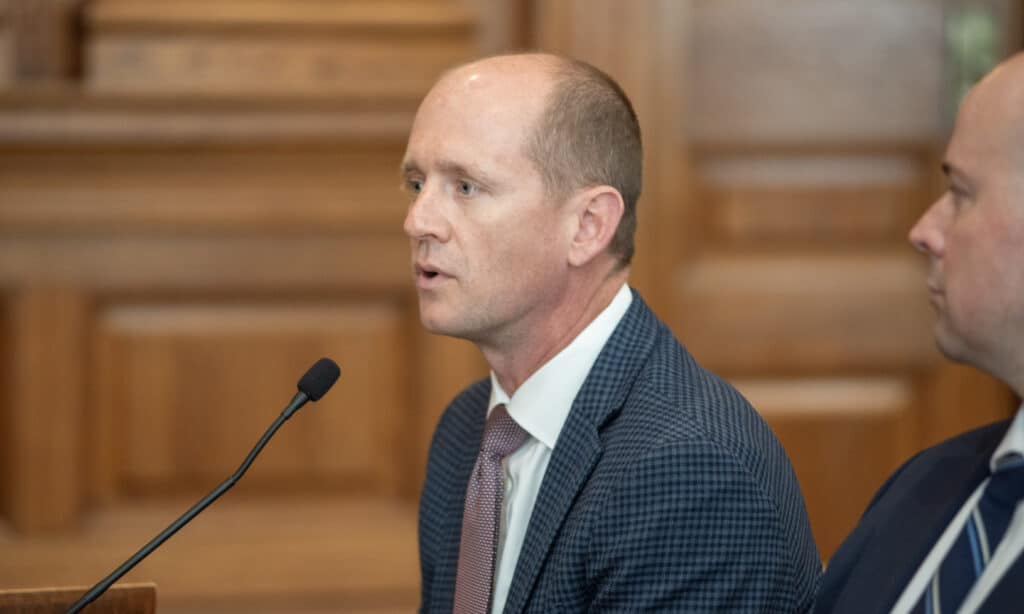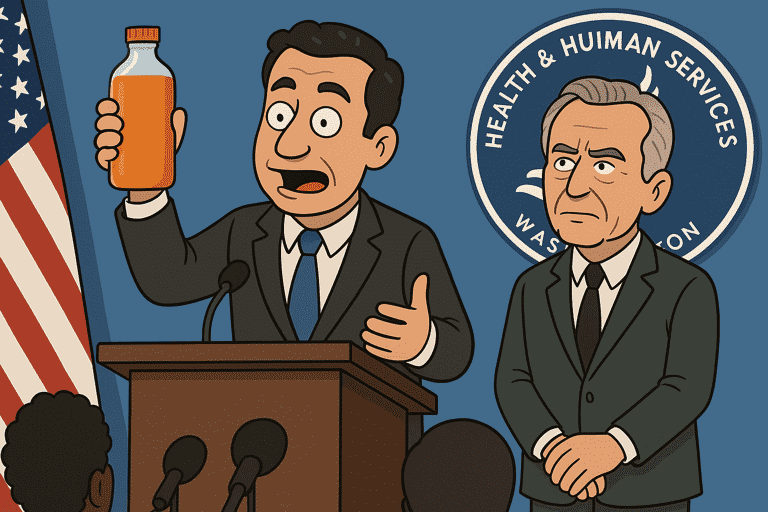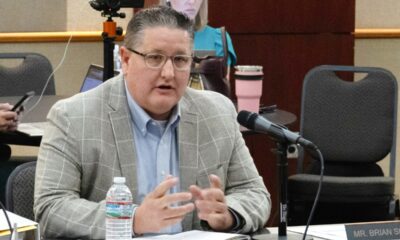News from the South - Missouri News Feed
Senate set to approve Missouri governor’s shakeup of state education board

by Annelise Hanshaw, Missouri Independent
April 24, 2025
Missouri Gov. Mike Kehoe’s makeover of the State Board of Education is nearly complete, with the state Senate set to confirm the last of his four new appointments this week.
The turnover on the eight-member board also means its longtime leadership has been pushed aside. That includes Charlie Shields, the former Republican lawmaker who has served on the board since 2012 and was its most recent board president.
Shields told The Independent he was willing to continue serving but supports the governor’s appointments.
“We’re in a good position to move education forward,” he said.
The shakeup has created some friction in the confirmation process, with Ash Grove Republican state Sen. Mike Moon and Florissant Democratic Sen. Angela Mosley asking pointed questions of appointees during their Senate hearings.
That continued on Wednesday, when Moon was the lone “no” vote on the appointment of Thomas Prater, an eye surgeon from Springfield.
Moon said during the hearing he had received complaints from his district stemming back to Prater’s time serving on the Springfield Public Schools Board of Education.
“There are some people in Springfield who were concerned about things that have happened on the school board after I left,” Prater told The Independent. “So I didn’t have much control over it.”
On the board, Prater helped in the hiring process of former superintendent John Jungmann in 2014 shortly before his departure.
Jungmann faced criticism, as reported by the Springfield News-Leader in 2021, over his diversity and equity training that some labeled “critical race theory.” He was also under fire for his choices on safety measures during the pandemic.
Moon asked Prater how he supported a superintendent who was a proponent of diversity, equity and inclusion initiatives and what that means today with a governor who has spoken against diversity programs.
Prater said Jungmann was “by far the most experienced and qualified candidate that we interviewed.”
“I don’t remember any kind of DEI discussions coming up in our interviews with him that would have given us the indication, one way or the other, where he stood,” Prater told Moon.
Mosley pushed back on the notion that DEI is harmful.
“You don’t feel that diversity is important,” she said, asking where Prater stood. “All the districts are pretty diverse, so you need to know how to effectively support each area of diversity.”
Prater said he was “right between” Mosley and Moon on the subject, giving an anecdote that he supported the hiring of a Black football coach over a similarly qualified white candidate.
The board is set up to not be dominated by a political party, with law stipulating there can be a maximum of four members of a party. Many appointees, on other state boards as well, take on the “independent” title to conform to this rule.
Prater is joining the board as an independent. His political contributions include donations to Democrats like state Rep. Betsy Fogle of Springfield and St. Louis Circuit Attorney Gabe Gore. But the majority of his donations benefit Republican candidates, with $21,000 given to Kehoe’s political action committee, American Dream PAC, and numerous donations given to former U.S. Sen. Roy Blunt.
Prater said he has been an independent for “as long as he can remember.”
Shields has repeatedly spoken about board matters with a bipartisan, or nonpartisan, perspective. He told The Independent that the board is intended to be this way.
Appointments are eight-year terms, setting members up to look at issues long-term. These two pieces are “important,” Shields said.
He feels confident that the appointees he knows, Prater and attorney Jon Otto, will take the “same view.”
“I know them to both be really thoughtful, high quality people,” he said. “I think they’ll make great board members.”
Prater was appointed by former Gov. Mike Parson a year ago, serving in an interim capacity while a filibuster blocked full confirmation. He has been sitting in the audience at state board meetings, he said.
Tawni Hunt Ferrarini was appointed at the same time last year by Parson, but Kehoe did not reappoint her to the board and instead chose Brooks Miller for the seat.
Miller, former president and CEO of Jordan Valley Community Health Center in Springfield, takes on the role after recently serving on Truman State University’s board.
He told committee members Wednesday that his experience in community health will help him look for needs inside Missouri’s schools.
“I think that (community health) really kind of goes hand-in-hand with serving children,” he said. “It’s hard to teach a child that has a toothache or other illness.”
Miller is identified as a Republican in his appointment. He donated to President Donald Trump’s campaign and U.S. Rep. Eric Burlison, but also gave $1,000 to Crystal Quade, who lost her bid as the Democratic nominee for governor in November. Quade is from Springfield, which Miller has strong ties to despite currently residing in Sunrise Beach.
Last week, the Senate confirmed the appointment of Otto and Mike Matousek.
Matousek, a Republican from Kansas City, recently served on the Platte County School Board and is the former legislative director for U.S. Rep. Sam Graves.
In his campaign for school board, Matousek opposed mask and vaccine mandates and carried conservative stances on hot-button issues into his time on the board. He was the only member to vote for the district to take up an official bathroom policy that would restrict transgender students’ access to restrooms that fit their gender identity.
Moon complimented Matousek’s willingness to stand alone on an issue.
“You’re not afraid to take those issues on, or at least ask the questions and let them be deliberated,” he said during the hearing.
Matousek has made contributions to several Republican candidates, including state Rep. Josh Hurbert, a Smithville resident who works for Christian private school advocacy and assistance organization Herzog Tomorrow Foundation. Hurlbert also donated to Matousek’s campaign for school board in 2022.
Matousek told The Independent that he was approached about joining the State Board of Education and thought it over before embracing the role.
“Public education is changing in Missouri, and I’d rather be at the table,” he said.
During the Senate Gubernatorial Appointments Committee hearing last week, Mosley asked Matousek questions about his stance on open enrollment and charter schools, asking if he would support funding for public schools or lean on alternatives to neighborhood schools.
Matousek is generally supportive of open enrollment, if the state legislature chooses to pass it into law, but is concerned about provisions that would obligate school districts to transport students that enroll outside their home district. But those decisions are up to state lawmakers, he said.
Mosley’s questions were halted after Moon whispered to the legislative aide of the committee chair, who then asked her to reserve the rest of her questions for time outside of the hearing. Matousek was confirmed by the full Senate the next day.
The Senate also confirmed Otto, who currently serves as general counsel for Evergy.
Otto is a noted advocate of charter schools. He helped found Académie Lafayette Charter Schools in Kansas City and has served on the board of the Missouri Charter Public School Association.
He told The Independent he didn’t have definitive plans for the board, saying he had to “get in and see what is working” first but noted potential for “a lot of new things.”
Otto has made a few contributions solely to Democratic candidates, like a $500 donation to U.S. Rep. Sharice Davids from Kansas.
Gabby Picard, a spokeswoman for Kehoe, said selections were made with the governor’s priorities in mind.
“Gov. Kehoe hopes that the board will continue to address and prioritize increased accountability in school performances and student outcomes, supporting opportunity across geographic and socioeconomic lines and supporting non-traditional school options like charter or virtual schools,” she said in a statement.
Prater and Miller’s appointments must receive final approval in the Senate before they can take office.
YOU MAKE OUR WORK POSSIBLE.
Missouri Independent is part of States Newsroom, a nonprofit news network supported by grants and a coalition of donors as a 501c(3) public charity. Missouri Independent maintains editorial independence. Contact Editor Jason Hancock for questions: info@missouriindependent.com.
The post Senate set to approve Missouri governor’s shakeup of state education board appeared first on missouriindependent.com
Note: The following A.I. based commentary is not part of the original article, reproduced above, but is offered in the hopes that it will promote greater media literacy and critical thinking, by making any potential bias more visible to the reader –Staff Editor.
Political Bias Rating: Center-Right
The content is largely focused on the appointments to the Missouri State Board of Education by Republican Governor Mike Kehoe, detailing the political backgrounds of the appointees and their views on significant education policies. While it includes viewpoints from both Republican and Democratic Senators during the confirmation process, the emphasis on Republican appointees and the supportive comments from other Republicans indicate a slant towards the right. The mention of "diversity, equity, and inclusion" issues, often contentious topics in contemporary education debates, suggests a framing that aligns more with center-right perspectives in the context of the current political landscape. However, the article maintains a degree of neutrality by providing quotes and perspectives from both sides, preventing it from being categorized as explicitly right-leaning or far-right.
News from the South - Missouri News Feed
Man arrested for alleged harassment at local synagogues

SUMMARY: Dennis Brian Clump Jr., a 50-year-old man with a criminal history including a murder conviction, has been arrested in St. Louis County for felony harassment after allegedly disturbing local synagogues over the past year. Prosecutors claim he made unwanted visits and disturbing calls, causing emotional distress to congregants. While the head of security for the Jewish Federation stated that the harassment does not appear to be driven by anti-Semitism, he noted an increase in threats against Jewish communities recently. The ADL reported a spike in anti-Semitic incidents in the area, particularly following recent conflicts. Clump is held on a $500,000 bond.

A man previously convicted of 2nd degree murder has been arrested after prosecutors said he repeatedly harassed people at local synagogues over the course of the past year. FOX 2’s Max Diekneite reports.
St. Louis News: FOX 2 covers news, weather, and sports in Missouri and Illinois. Read more about this story or see the latest updates on our website https://FOX2Now.com
Follow FOX 2 on social media:
YouTube: https://www.youtube.com/FOX2Now
Facebook: https://www.facebook.com/FOX2Now/
Twitter: https://twitter.com/FOX2Now/
Instagram: https://www.instagram.com/fox2now/
TikTok: https://tiktok.com/@fox2now
SnapChat: https://www.snapchat.com/add/fox2now
News from the South - Missouri News Feed
FDA seeks to phase out 8 common food dyes

by Jennifer Shutt, Missouri Independent
April 23, 2025
WASHINGTON — Trump administration health officials announced Tuesday they hope to eliminate eight petroleum-based synthetic dyes from the nation’s food supply before the end of next year, though they haven’t received guarantees or written agreement from food companies.
Food and Drug Administration Commissioner Marty Makary detailed efforts to phase out the dyes during a press conference alongside Health and Human Services Secretary Robert F. Kennedy Jr. at the department’s Washington, D.C., headquarters.
“Let’s be honest, taking petroleum-based food dyes out of the food supply is not a silver bullet that will instantly make America’s children healthy, but it is one important step,” Makary said.
The FDA’s proposal would revoke authorization for Citrus Red No. 2 and Orange B while setting up the agency to work “with industry to eliminate” Green No. 3, Red No. 40, Yellow No. 5, Yellow No. 6, Blue No. 1 and Blue No. 2.
FDA will also authorize new, natural food dyes in the months ahead.
Kennedy said the Trump administration has an “understanding,” but not an “agreement” with food companies that use the dyes, before deferring to Makary, who said that “you win more bees with honey than fire.”
“There are a number of tools at our disposal. And so I believe in love, and let’s start in a friendly way and see if we can do this without any statutory or regulatory changes,” Makary said. “But we are exploring every tool in the toolbox to make sure this gets done very quickly. And they want to do it. They want to do it.
“So why go down a complicated road with Congress when they want to do this? They don’t want to deal with the patchwork of 30 different state plans.”
Christopher Gindlesperger, senior vice president of public affairs and communications at the National Confectioners Association, released a written statement that didn’t appear to agree entirely with the FDA’s proposed phase-out, however.
“FDA and regulatory bodies around the world have deemed our products and ingredients safe, and we look forward to working with the Trump Administration and Congress on this issue,” Gindlesperger wrote. “We are in firm agreement that science-based evaluation of food additives will help eliminate consumer confusion and rebuild trust in our national food safety system.”
Removing additives
During the press conference, Makary held up watermelon, beet and carrot juices in clear containers, encouraging food companies to use those as dye, instead of the ones that may be removed from the market.
“We are simply asking American food companies to replace petroleum-based food dyes with natural ingredients for American children, just as they already do for children in other countries,” he said. “American children deserve good health.”
Makary said he believes there are several health conditions associated with petroleum-based synthetic dyes in food, including attention-deficit/hyperactivity disorder, obesity, diabetes, insulin resistance, cancer, genomic disruption, gastrointestinal issues, and allergic reactions.
Kennedy said his goal as HHS secretary is to remove all additives in food served in schools “that we can legally address.”
The department, Kenedy said, will also work with Congress and President Donald Trump to increase labeling for food ingredients that Kennedy called addictive, including sugar.
“There’s things that we’ll never be able to eliminate, like sugar. And sugar is poison and Americans need to know that,” Kennedy said. “It is poisoning us. Is giving us a diabetes crisis.”
Health effects unclear
Martin Bucknavage, senior food safety extension associate at Penn State University, said during an interview with States Newsroom that petroleum-based synthetic food dyes are derived just to get the color.
“It’s not like it’s just a nasty chemical that they’re putting in there,” he said. “It’s something that’s been taken, it’s been chemically made, modified and then purified, so that it is just that chemical that provides that color. And then those colors have been studied.”
Similar to the complicated nature of nutrition studies — which can have a challenging time separating out a person’s genetics, exercise and environmental factors from one specific part of their diet — research on food dyes hasn’t been conclusive, Bucknavage said.
“In some cases, it does have an impact on hypersensitivity, but not in all cases,” he said. “And not all studies are basically showing the same thing. So there’s a lot of variability that exists out there.
“And I’m not saying, ‘Listen, we shouldn’t go through and study these things more and get better information on them.’ We certainly should. But again, it’s not an easy thing to do. Some of these studies take time and take a lot of money and sometimes the results are kind … more variable in terms of the results.”
States regulating dyes
The FDA’s announcement wasn’t the first time the federal government or state lawmakers have sought to ban food additives or synthetic dyes.
The Biden administration announced in January that the federal government would ban Red No. 3 in food beginning in 2027 and from medicines in 2028. Makary said during the press conference Tuesday the current administration plans to ask companies to phase out that dye sooner.
California lawmakers approved a bill in 2023 that will ban Red No. 3, propylparaben, brominated vegetable oil and potassium bromate from food starting in 2027.
The following year, legislators in the Golden State approved another measure that, starting in 2028, will ban six food dyes — Blue 1, Blue 2, Green 3, Red 40, Yellow 5 and Yellow 6 — from being sold in schools.
Those two state laws followed the California Environmental Protection Agency’s Office of Environmental Health Hazard Assessment releasing a report in 2021 that concluded “scientific literature indicates that synthetic food dyes can impact neurobehavior in some children.”
Virginia lawmakers approved legislation earlier this year that Gov. Glenn Youngkin signed in March to ban some artificial food dyes in public schools, starting in July 2027.
In deeply red West Virginia, Republican Gov. Patrick Morrisey signed a bill a few days later that will prevent seven artificial dyes from being sold in grocery stores starting in 2028 or included in school lunches starting in August.
Arizona and Utah have implemented laws of their own addressing food dyes.
The Environmental Working Group, an advocacy organization focused on strengthening health standards, reports that legislators in several states, including Arkansas, Florida, Indiana, Iowa, Kentucky, Louisiana, Maryland, Minnesota, Missouri, New Jersey, New Mexico, North Carolina, Oklahoma, Oregon, Pennsylvania, Rhode Island and Washington have introduced bills that could ban certain food dyes or chemicals.
Melanie Benesh, EWG vice president for government affairs, wrote in a statement about the FDA announcement that the federal agency “has known for decades that synthetic food dyes are linked to health problems, particularly in children, but has failed to act.”
“We’re pleased the administration is following the lead of states like California and West Virginia by finally announcing their intent to ban dyes,” Benesh wrote. “We’re grateful that states like California and West Virginia have forced the FDA to make food safety a bigger priority.”
Peter Lurie, president and executive director of the self-described food and health watchdog group Center for Science in the Public Interest, wrote in a statement released Monday that Americans “don’t need synthetic dyes in the food supply, and no one will be harmed by their absence.”
“The most important thing to know about food dyes is that their only purpose is to make food companies money,” Lurie wrote. “They are purely cosmetic, serving no nutritional function. In other words, food dyes help make ultra-processed foods more attractive, especially to children, often by masking the absence of a colorful ingredient, like fruit.”
Ashley Murray contributed to this report.
Missouri Independent is part of States Newsroom, a nonprofit news network supported by grants and a coalition of donors as a 501c(3) public charity. Missouri Independent maintains editorial independence. Contact Editor Jason Hancock for questions: info@missouriindependent.com.
The post FDA seeks to phase out 8 common food dyes appeared first on missouriindependent.com
Note: The following A.I. based commentary is not part of the original article, reproduced above, but is offered in the hopes that it will promote greater media literacy and critical thinking, by making any potential bias more visible to the reader –Staff Editor.
Political Bias Rating: Center-Left
The content reflects a Center-Left bias primarily through its focus on health regulations and food safety, aligning with progressive views on consumer protection and public health. It discusses the government’s intent to phase out synthetic food dyes in favor of natural alternatives, which is a policy that resonates with findings from health advocacy groups and studies highlighting potential health concerns associated with such additives.
Furthermore, it features quotes from officials like Health and Human Services Secretary Robert F. Kennedy Jr., who expresses a commitment to banning harmful additives, which indicates a proactive stance on health issues often associated with left-leaning policy agendas. Additionally, the piece includes perspectives from advocacy organizations critical of the status quo, reinforcing a narrative that advocates for stronger health regulations, a hallmark of Center-Left politics.
While the reporting doesn’t exhibit overt partisanship, it does reflect a preference for government intervention in health matters, a characteristic often associated with more liberal political viewpoints.
News from the South - Missouri News Feed
Federal family planning funding freeze in Missouri impacts more than Planned Parenthood

by Anna Spoerre, Missouri Independent
April 22, 2025
Until April, much of the $5,000 a month in federal Title X family planning funding received by the Dent County Health Center went toward purchasing contraceptive devices for some of the 200 people they serve annually.
But the health center’s administrator, Zachary Moser, said a recent decision to freeze family planning funds has the center fearful it won’t be able to continue covering family planning services for its rural southeastern Missouri population.
In late March, the Trump administration froze about $27.5 million in Title X funding to a number of states, including several million dollars to Missouri that are distributed by Missouri Family Health Council.
The Title X program was created more than half a century ago as a funding stream to support access to family planning options, including contraceptives, testing and treatment for sexually transmitted infections and cancer screenings related to reproductive health.
Need to get in touch?
Have a news tip?
While some have speculated the administration was trying to target abortion providers, only seven of the 52 recipients of Title X grants through the Missouri Family Health Council are Planned Parenthood clinics. A breakdown of how funding is distributed between clinics was not made available.
The majority of the recipients are health centers like Moser’s. Moser said in the short-term, Dent County has redirected some general revenues toward family planning services and continues to offer them to patients for free.
“Will we be able to do that indefinitely?” he asked. “No.”
For example, instead of Title X funding covering the cost of an IUD — a contraceptive device that is inserted into the uterus to prevent pregnancy — the patient would instead have to foot the bill, choose a less-effective but more affordable or go without.
Moser said some of the longer-lasting contraceptive devices can cost upwards of $1,000 out of pocket, a price that isn’t feasible for most of the people the center serves.
Limiting or eliminating family planning services can impact entire communities and public health.
Michelle Trupiano, executive director of the Missouri Family Health Council, said if the freeze continues, she anticipates immediate health consequences like increased unintended pregnancies, later-stage cancer diagnoses, more overall disease and worse maternal health outcomes.
Missouri Family Health Council has been leading the state’s Title X planning program for nearly 45 years. Their network of 52 clinics includes health departments, community action agencies, federally-qualified health centers and hospital-based clinics. They also work with family planning clinics, including seven Planned Parenthood locations.
“The Trump administration and Elon Musk are using Title X to push their own political agenda and impose their personal beliefs on everyone at the expense of people who need critical access to care,” Emily Wales, president and CEO of Planned Parenthood Great Plains, said in a statement. ” …. If blocking health care for low-income patients is what the Trump administration means by ‘making America great again,’ then we want no part of it. It’s cruel, it’s calculated, and it won’t stop us from fighting for our patients.”
Trupiano said she’s not sure why Missouri was targeted while other states with Planned Parenthood clinics were left untouched. But the letter Trupiano received announcing the freeze cited compliance concerns around diversity, equity and inclusion initiatives, or DEI. She said the grant they were awarded includes “access, quality and equity” among its priorities.
Through Title X funding, Missouri clinics served nearly 34,800 patients in 2024. Of those, 83% were female, 75% were under the age of 34 and 45% were uninsured.
Last year, 58% of the patients served were white and 30% were Black.
“We know the devastating impact and consequences that will result if this is not swiftly resolved,” Trupiano said.
The funding to Missouri Family Health Council was paused the day before year four of a five-year grant cycle began on April 1.
The Dent County Health Center applied for Title X funding after hiring a full-time nurse practitioner in 2022. Not only does the grant help them increase health care access for patients, but Moser said it also backs up an ongoing effort to inform more young people on pregnancy prevention.
In his corner of southeast Missouri there’s still a lot of stigma around premarital sex, Moser said, making it difficult to educate teenagers on pregnancy-prevention. Among those teens who do seek out contraceptive access at the health center, he said many don’t want to go through their parent’s insurance policy because they want to keep their choices private.
“We won’t have any way to serve those patients,” Moser said. “It’s going to limit access for sure, which is going to drive up the teen pregnancy rate, drive up unwanted pregnancies and have other unintended consequences.”
Missouri’s teen pregnancy birth rate has steadily declined over the past several years, according to the Centers for Disease Control and Prevention, though it still remains among the highest in the country.
Stephanie Kraft Sheley, director of Right By You, a Missouri-based nonprofit that in part advocates for contraceptive access, said some of the most common calls to the organization’s hotline revolve around navigating birth control access.
She said a continued freeze could have “catastrophic” effects, potentially shuttering programs or clinics whose efforts help reduce unintended pregnancies.
If the freeze continues, Kraft Sheley said, that likely means navigating fewer people to pregnancy-prevention options and increasingly directing them to abortion options. While abortion is now legal in Missouri, access is still difficult for many people, as only three Planned Parenthood clinics have resumed procedural abortions and medication abortions remain unavailable.
Missouri abortion ban clears House, heads to Senate despite concerns from top Republican
Trupiano has spent the past few weeks helping clinics like Moser’s navigate the abrupt funding change as they work to determine how to stretch resources in order to continue providing free family planning services to patients.
“They already were working in the leanest possible way to provide this critical care,” she said. “These cuts are very devastating, and for a lot of the health departments and other safety net clinics, this isn’t the only infrastructure cut that they are facing.”
That rings true in Dent County, where Moser said Title X is one of a handful of programs under threat right now. He remains particularly concerned about continued federal funding for the county’s lead testing and vaccine programs, both of which rely entirely on grant funding.
Trupiano and others have been drawing attention to Missouri’s public health safety net for years, raising concerns that clinics and providers are stretched beyond capacity. Funding freezes such as this only cause longer wait times and more people who ultimately go without timely care as the burden shifts off one clinic and onto another, she said.
For example, if a clinic relying on Title X funding were ultimately to close, those patients would be forced to find another provider. In many places, new patient wait lists are already months long. For those without reliable access to transportation, getting to a different clinic further away might be too much of a burden to continue care.
While the greatest harm will be inflicted on the most vulnerable Missourians, Trupiano said, “the impact is going to be borne by everybody.”
YOU MAKE OUR WORK POSSIBLE.
Missouri Independent is part of States Newsroom, a nonprofit news network supported by grants and a coalition of donors as a 501c(3) public charity. Missouri Independent maintains editorial independence. Contact Editor Jason Hancock for questions: info@missouriindependent.com.
The post Federal family planning funding freeze in Missouri impacts more than Planned Parenthood appeared first on missouriindependent.com
Note: The following A.I. based commentary is not part of the original article, reproduced above, but is offered in the hopes that it will promote greater media literacy and critical thinking, by making any potential bias more visible to the reader –Staff Editor.
Political Bias Assessment: Center-Left
The content in question demonstrates a Center-Left political bias. It focuses on the implications of funding cuts to the Title X family planning program, emphasizing the negative effects on public health services and low-income populations. The language reflects concern for access to contraceptive services and reproductive health, which are often prioritized by left-leaning policies and advocacy groups. The article includes quotes from health officials and advocates who express worry about the potential consequences of funding freezes, specifically tying the cuts to decisions made by the Trump administration. While it presents factual information, the overall tone and framing of the issue highlight a critical view of the administration’s actions, aligning more closely with a Center-Left perspective that advocates for expanded access to healthcare and reproductive services.
-

 News from the South - Arkansas News Feed6 days ago
News from the South - Arkansas News Feed6 days agoArkansan appears on Wheel of Fortune
-

 News from the South - Florida News Feed4 days ago
News from the South - Florida News Feed4 days agoJim talks with Rep. Robert Andrade about his investigation into the Hope Florida Foundation
-

 News from the South - Missouri News Feed6 days ago
News from the South - Missouri News Feed6 days agoDrivers brace for upcoming I-70 construction, slowdowns
-

 News from the South - Oklahoma News Feed7 days ago
News from the South - Oklahoma News Feed7 days agoThursday April 17, 2025 TIMELINE: Severe storms Friday
-

 Mississippi Today7 days ago
Mississippi Today7 days agoSee how much your Mississippi school district stands to lose in Trump’s federal funding freeze
-

 News from the South - Texas News Feed6 days ago
News from the South - Texas News Feed6 days agoCruz, Zeldin: Roll back Biden-era regulations targeting oil and gas industry | National
-

 News from the South - Alabama News Feed5 days ago
News from the South - Alabama News Feed5 days agoOp-Ed: Colleges shouldn’t need remedial algebra classes: Five K-8 policy solutions to address math proficiency | Maryland
-

 News from the South - Louisiana News Feed6 days ago
News from the South - Louisiana News Feed6 days agoSales tax increase at Hosston TA truck stop passed by Caddo Commission | Louisiana






































